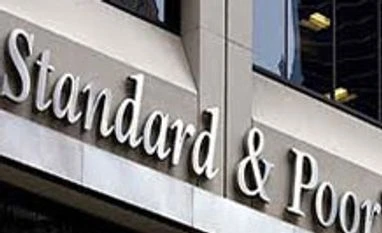The bank said it would lend dollars and euros to major companies that were willing to put up their foreign borrowings as collateral.
The move means the state will in effect take on credit risk for the companies, whose foreign debt obligations have shot up in rouble terms because of the currency’s sharp slide this year.
Even before the move, Standard & Poor’s ratings agency put Russia’s sovereign credit outlook on “creditwatch negative”, meaning it could be downgraded to junk as soon as January due to a “rapid deterioration of Russia’s monetary flexibility”.
S&P, Moody’s and Fitch all now rate Russia one notch above junk. The finance ministry said it was holding talks with ratings agencies to explain the situation in the economy.
The authorities have taken several steps in recent weeks to arrest the rouble’s slide and avoid a spike in inflation after years of stability, developments that could threaten Putin’s popularity. They include a sharp interest rate hike, curbs on grain exports and informal capital controls.
While Russia’s sovereign foreign debts are minimal, state and private companies and banks have accumulated $600 billion in foreign debts, of which around $100 billion are due next year.
The ability to repay the loans or roll them over has been severely reduced this year by Western sanctions, imposed on Russia for its actions in Ukraine, which effectively shut its companies and banks out of Western debt markets. But the economic crisis in Russia’s heavily oil-dependent economy goes wider. Moody’s ratings agency said on Tuesday that it expected Russia’s GDP to contract by 5.5 per cent in 2015 and 3 per cent in 2016, under the effect of the plunge in oil prices and the rouble’s slide.
“These developments will likely lead to a severe deterioration in the operating environment for Russian corporates, namely higher inflation, unemployment and debt-servicing costs as well as lower domestic demand, resulting in a deeper and more protracted decline in domestic economic activity than previously anticipated,” Moody’s said.
The central bank said Wednesday’s move was aimed at “helping to refinance foreign credits by Russian exporters in foreign currencies maturing in the near future at a time of their restricted abilities to access international capital markets”.
It said these lending operations would also help to bring the rouble exchange rate into line with fundamentals and reduce volatility.
Loans are to be provided for up to one year at auctions, at a minimal rate of Libor plus 0.75 per cent.
Oleg Kouzmin, an economist at Renaissance Capital, said the amount allocated was small enough not to undermine the central bank’s ability to support the rouble. State-controlled VTB Bank said it would use the facility if needed but that “currently, there is no such need”.
The central bank and the finance ministry have also promised to help banks with extra rouble liquidity and regulatory measures.
The lower house of parliament rushed to pass a draft law on Friday that will give the banking sector a capital boost of up to 1 trillion roubles ($18.33 billion).
Dmitry Polevoy, chief economist for Russia at ING, said the central bank had taken too long to act: "The problems with forex funding emerged in early September and have only been getting worse since then. The Central Bank of Russia has mostly been putting out fires rather than preventing them."
)